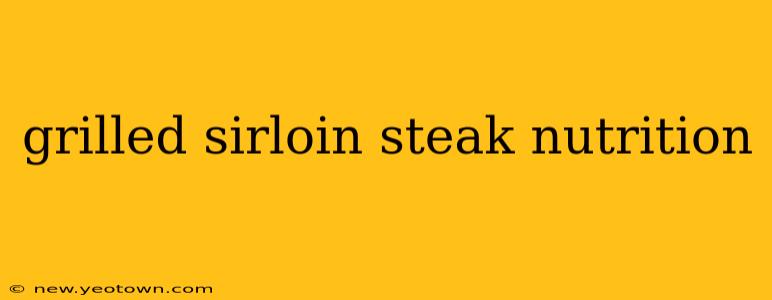The sizzle of a perfectly grilled sirloin steak, the aroma of smoky char—it's a culinary experience many crave. But beyond the deliciousness, what's the nutritional profile of this popular cut of beef? Let's dive into the juicy details.
A 3-ounce serving of grilled sirloin steak (approximately 85 grams) packs a considerable nutritional punch. It’s a fantastic source of high-quality protein, essential for building and repairing tissues, making it a staple for athletes and anyone looking to maintain a healthy weight. Beyond protein, you'll find a good amount of iron, crucial for carrying oxygen throughout your body, and zinc, vital for immune function and wound healing. Sirloin is also a decent source of B vitamins, which play important roles in energy metabolism and nerve function.
How Many Calories Are in a Grilled Sirloin Steak?
The calorie count in a grilled sirloin steak can vary depending on the cut, the size of the serving, and the cooking method. A 3-ounce serving typically contains around 180-200 calories. However, adding butter, oil, or marinades during preparation can significantly increase the calorie count.
Is Sirloin Steak Good for Weight Loss?
This is a question that often sparks debate. While sirloin is leaner than many other cuts of beef, its high protein content contributes to satiety, potentially helping with weight management. The key here is portion control. Sticking to recommended serving sizes and mindful eating habits are crucial for achieving weight loss goals. Remember, a healthy diet is about balance, not elimination.
What Are the Health Benefits of Eating Sirloin Steak?
- High-Quality Protein: Essential for building and repairing tissues, supporting muscle growth, and maintaining a healthy metabolism.
- Iron: Crucial for oxygen transport throughout the body, preventing anemia.
- Zinc: Supports immune function, wound healing, and cell growth.
- B Vitamins: Essential for energy production, nerve function, and red blood cell formation.
What Are the Potential Downsides of Eating Sirloin Steak?
- High in Saturated Fat: While sirloin is leaner than other cuts, it still contains saturated fat, which should be consumed in moderation to reduce the risk of heart disease.
- Sodium Content: Processed sirloin steaks or those with added seasonings can be high in sodium, potentially contributing to high blood pressure.
- Potential for Carcinogens: Grilling at high temperatures can lead to the formation of harmful compounds like heterocyclic amines (HCAs) and polycyclic aromatic hydrocarbons (PAHs). Using marinades and grilling techniques that minimize charring can help reduce this risk.
How Can I Prepare Sirloin Steak Healthily?
Choosing lean cuts and cooking methods that minimize added fats is key. Here are some healthy preparation tips:
- Trim Visible Fat: Remove excess fat before cooking to reduce saturated fat intake.
- Grill, Bake, or Broil: Opt for dry-heat cooking methods instead of frying.
- Use Healthy Marinades: Experiment with herbs, spices, and citrus juices instead of high-fat sauces.
- Control Portion Sizes: Stick to recommended serving sizes to manage calorie intake.
Is Sirloin Steak a Good Source of Iron?
Yes, sirloin steak is a good source of heme iron, which is more readily absorbed by the body than non-heme iron found in plant-based sources. This makes it particularly beneficial for individuals at risk of iron deficiency.
How Much Sirloin Steak Should I Eat Per Week?
The recommended amount of red meat per week varies depending on individual needs and health goals. Consult with a healthcare professional or registered dietitian to determine a suitable intake based on your specific circumstances. Remember that variety is key in a balanced diet.
The information provided here is for general knowledge and informational purposes only, and does not constitute medical advice. Always consult with a qualified healthcare professional for personalized dietary advice. Enjoy your sirloin steak responsibly!

